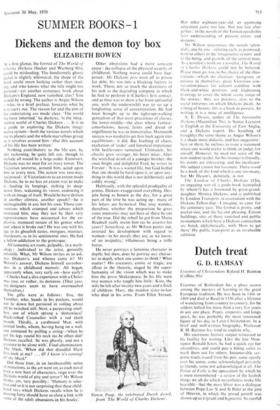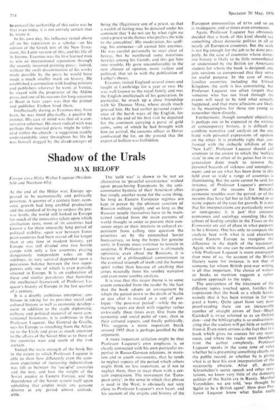Dutch treat
G. D. RAMSAY
Erasmus of Christendom Roland H. Bainton (Collins 50s) Erasmus of Rotterdam has a place secure among the masters of learning in the great European tradition. He was born in 1466 or 1469 and died at Basel in 1536 after a lifetime of wandering from country to country, for he seldom halted for more than a very few years in any one place. Popes, emperors and kings apart, he was probably the most renowned figure of his day in Latin Christendom. In a brief and well-written biography, Professor R. H. Bainton has tried to explain why.
His enormous literary output witnessed to his facility for writing. Like the late Mon- signor Ronald Knox, he had a quick eye for absurdities, and could pen a biting satire to mark them out for others. Innumerable sar- donic tracts issued from his pen, some openly over his name, some acknowledged privately to friends, some not acknowledged at all. The Praise of Folly is the opusculum by which he is most remembered—a review of the foolish things we all do which nevertheless make life bearable—but the most bitter was a dialogue between Pope Leo X and St Peter at the gate of Heaven, in which the proud pontiff was shown up as a tyrant and hypocrite. So careful
to conceal the authorship of this satire was he that even today it is not entirely certain that he wrote it.
In his own day, his influence rested above all on his reputation as a scholar—on his edition of the Greek text of the New Testa- ment, his Latin version of this, and his life of St Jerome. Erasmus was the first learned man to win an international reputation through the recently invented printing press: indeed, without the swift dissemination of his works made possible by the press he would have made a much smaller mark on history. He established a connection with leading printers and publishers wherever he went; at Venice, he stayed with the proprietor of the Aldine press, and one of his reasons for long sojourns at Basel in later years was that the printer and publisher Froben lived there.
Intellectually daring as Erasmus may have been, he was timid physically, a pacifist by instinct. His cast of mind was that of a con- servative reformer. His most radical wish was perhaps that married priests might be toler- ated within the church—a suggestion readily understandable since throughout his life he was himself dogged by the disadvantages of being the illegitimate son of a priest, so that a wealth of feeling may be detected under his comment that 'I do not see by what right we send a priest to the flames who prefers the wife to the concubine'. His moderation, his scoff- ing, his eminence—all earned him enemies. He was careful personally to steer clear of heresy, but he numbered some notorious heretics among his friends, and this got him into trouble. He grew uncomfortable in the new climate of opinion, more violent and political, that set in with the publication of Luther's theses.
Erasmus visited England several times and taught at Cambridge for a year or two. He was well known to the royal family and met the English intellectuals of his generation. In particular, he struck up a close friendship with Sir Thomas More, whose death much grieved him. He had earlier personal experi- ence of the harsh ways of the English, for when at the end of his first visit he departed for the continent carrying a purse of gold coins, some of which he had brought with him on arrival, the customs officer at Dover confiscated the lot, on the ground that the export of bullion was forbidden.



































 Previous page
Previous page